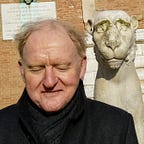Unmasking Ozymandias
Not too many people name their sons Ozymandias, It’s another sign of his extinction.
And that’s the subject of Shelley’s famous poem — a sonnet that modestly implies that artistry secures immortality more surely than does earthly dominion. The poem’s form and elegant rhythms contain some memorable lines, such as the opening “I met a traveller from an antique land” and the central declaration of the bygone king of kings: “Look upon my Works, ye Mighty, and despair!” Yet there is also enough contorted phrasing to make a schoolboy pause, and to show that this is not verse from our time; even as it speaks to our condition.
The poem took shape over the same Christmas gathering of 1817 that saw Shelley’s wife Mary write the Gothic classic “Frankenstein.” Shelley himself was inspired by conversations he shared about the newly re-discovered treasures of Egypt; Ozymandias was another name for Pharaoh Rameses II. Napoleon had brought back priceless artefacts to Europe from his Egyptian campaign of 1798, and sparked a resurgence of interest, and Shelley probably had Bonaparte’s recent fall in mind as he wrote about the transitory nature of earthly power.
Now, as the climate crisis accelerates, the desert lands of lone and level sands don’t just extend from the Sahara into the Sahel. 2021’s summer threatens to be the worst-ever for forest fires in Siberia, California, and Australia. While the empire of commodities that bears its name grows exponentially, Nature’s Amazon is shrinking. Unless huge and coordinated efforts are not just proposed, but pursued, and the consumer culture changes, our global cities will become so many colossal wrecks, buried in decay or drowned by rising seas.
In his poem, Shelley used the shattered face of the giant statue to convey the arrogance of the Pharaoh’s exultant sense of power. Ozymandias appreciated no greatness but his own; certainly, not the artistry of the sculptor at his command. Strangely, it was our present world of masks that brought the poem back to me. I was reading about the pollution caused by discarded masks. In the drive to produce them, biodegradability was not a priority. Hence, we have millions and millions of masks — you see them discarded every day — they may litter our future deserts when we have returned to dust.
But now, I’ve been reminded, Ozymandias did not wear a mask. He wanted his people to see his frowns and sneers and hear his cold commands and mocking words. And he was confident that the colossal structures that carried his name would forever elicit deference and praise. Now, who could that be from our time? Weathered away, in time there may be only one letter still legible; a “U.” “Nothing beside remains.”
Read the poem and reflect.
Ozymandias by Percy Bysshe Shelley
I met a traveller from an antique land,
Who said — “Two vast and trunkless legs of stone
Stand in the desert. . . . Near them, on the sand,
Half sunk a shattered visage lies, whose frown,
And wrinkled lip, and sneer of cold command,
Tell that its sculptor well those passions read
Which yet survive, stamped on these lifeless things,
The hand that mocked them, and the heart that fed;
And on the pedestal, these words appear:
My name is Ozymandias, King of Kings;
Look on my Works, ye Mighty, and despair!
Nothing beside remains. Round the decay
Of that colossal Wreck, boundless and bare
The lone and level sands stretch far away.”
